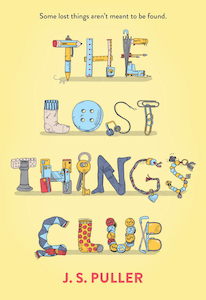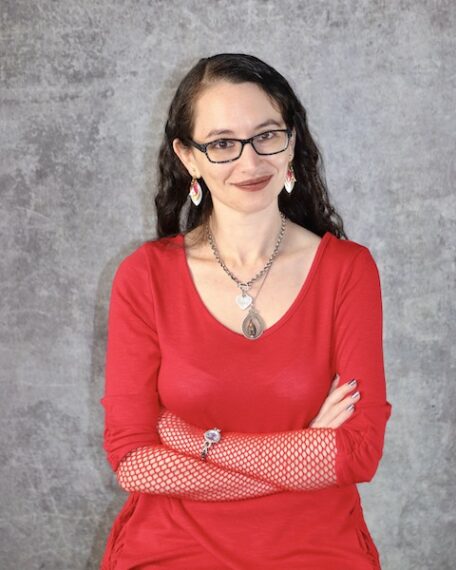J. S. Puller is a playwright and author from the Windy City, Chicago. She has a master’s degree in elementary education and a bachelor’s degree in theatre from Northwestern University. She is an award-winning member of the American Alliance for Theatre and Education has done research on the social-emotional benefits of arts education with the University of Chicago Consortium on School Research. When not writing, she can usually be found in the theatre. Possibly haunting it, like the Phantom of the Opera.
She is the author of two novels, Captain Superlative and The Lost Things Club, both published by Little, Brown Books for Young Readers. She also has several published plays, including: Women Who Weave (Playscripts, Inc.), Perseus and Medusa – It’s All Greek to Me! (Lazybee Scripts), and The Death of Robin Hood (Stage Rights). She also once had a script stolen by a theatre in Qatar. Which makes her feel kind of cool.
You are an author, but is it your day job? Of course, I dream of being an author full time, but right now, that’s just not feasible. Fortunately, I have a fantastic day job. I am the Senior Communications Strategist for the University of Chicago Consortium on School Research. The mission of the Consortium is to build the capacity for school reform by conducting research that identifies what matters for student success and school improvement.
As part of my graduate studies, I completed an action-research project on the impact of oral storytelling on fourth-graders. The Consortium was the perfect place for me, as it allowed me to continue in the world of educational research. Because of my action-research project, I was also able to serve as a research assistant when the Consortium designed a framework on the relationship between arts education and social-emotional development. So not only am I an author in the world of theatre and fiction, but I also have author credit on a research project, Arts Education and Social-Emotional Learning Outcomes Among K-12 Students: Developing a Theory of Action. This research also served me well when I was writing my second novel, The Lost Things Club.
Did you always want to be an author? No, actually. Growing up, I had my heart set on being an actor. The funny thing is, everyone knew I was a writer before I did. I was always scribbling funny top ten lists or writing fanfiction. When I was roasted at my senior year theatre banquet, a rather observant teacher noted that I always seemed to be writing the world into a play in my head. What clued me in was when I signed up to take a playwriting class during my undergraduate studies. I realized that I enjoyed writing much more than being on stage. And it helped that I had some extraordinary teachers!
What is your most recent book and what inspired you to write it? My most recent novel is The Lost Things Club, which came out in 2021 from Little, Brown and Company. It tells the story of Leah, who goes to spend the summer in Chicago with her younger cousin, TJ, who’s stopped speaking completely, after surviving a school shooting. Eager to help, she starts  following him as he sneaks out at night and discovers that he’s visiting a laundromat. Determined to discover why this laundromat brings her cousin to life, Leah and her new friend Violet follow him, unwittingly falling into an imaginary world called “The Land of Lost Things,” home to the socks and coins and buttons that disappear in the dryer. And when TJ hears about the wonders beyond the portal in the back of the dryer, he actually speaks! Eager to keep him talking, Leah and her new friends populate the world with characters, performing elaborate puppet shows that grab the attention of YouTube viewers everywhere. Soon Leah realizes that there’s something in this special world that TJ has to find and get back. But as the Lost Things Club works together to try and make TJ’s dreams a reality, they learn there are some lost things that can’t come back.
following him as he sneaks out at night and discovers that he’s visiting a laundromat. Determined to discover why this laundromat brings her cousin to life, Leah and her new friend Violet follow him, unwittingly falling into an imaginary world called “The Land of Lost Things,” home to the socks and coins and buttons that disappear in the dryer. And when TJ hears about the wonders beyond the portal in the back of the dryer, he actually speaks! Eager to keep him talking, Leah and her new friends populate the world with characters, performing elaborate puppet shows that grab the attention of YouTube viewers everywhere. Soon Leah realizes that there’s something in this special world that TJ has to find and get back. But as the Lost Things Club works together to try and make TJ’s dreams a reality, they learn there are some lost things that can’t come back.
The inspiration for this story comes, in part, from the research that I did on arts education and the way it can breathe life into the social-emotional aspects of learning. In particular, a lot of this story is derived from an anecdote, taken from a field interview:
“A theatre teaching artist noted, in reflecting on the way in which her work might affect students socially and emotionally, that “One of the hardest things in class is showing up, just showing up.” So she designed an activity around “showing up”: having each student stand up, one by one, while the other students clapped, and recite a line using a “performance voice.” At the end of the activity, a classroom teacher approached the theatre teaching artist, so moved that she herself could barely speak, and said, “That child doesn’t talk.” The teaching artist noted that this was normal—sometimes students did not wish to talk in front of their peers. The classroom teacher replied “No, you don’t understand, it’s on his IEP. We try to get him to speak, he doesn’t speak. He has elective mutism.” But in the context of this theatre activity, he chose to use his voice.”
I was so incredibly moved by the story of this boy. I have no idea who he is. I will never know him. I’ll never know how his story began or how it ends. But through the power of fiction, I can answer some of my own questions, and spread the message of the ability theatre has to help people overcome.
How do you hope your book uplifts those who read it? It probably goes without saying, but I’ll say it anyway: Mass shootings are an epidemic in this country and need to be curtailed. Until that day arrives, however, I want to quote a realization that Leah makes, observing her friends near the end of The Lost Things Club “The three of them were survivors of something terrible. People needed to see them. Not just to remember. Not just in the hope that something so awful would never happen to kids like them again. But also to understand that there was a life to live after surviving. And the three of them were figuring out how to do just that.”
Although the story is set in the aftermath of a tragedy, one that casts a long and dark shadow over the story, it’s ultimately a novel that celebrates more than it laments. It celebrates creativity, inspiration, and imagination. It celebrates theatre and innovation. It celebrates the act of not just surviving, but living. And I can’t think of anything more uplifting than that.
What do you find most fulfilling in the career that you’ve chosen? For me, nothing is more fulfilling than the chance to interact with my audience, in particular children. I absolutely love going to schools or libraries and giving presentations. I get so many hugs! I once had to be rushed out of a school library and hidden in a closet because the kids were chasing after me like I was one of the Beatles. (I was probably Ringo…) And then there’s the highest compliment any author can receive: “Thank you for writing this book. It changed the way I see things.”
Anything else you’d like to share with your readers? Only that I want to be as accessible as possible! Feel free to reach out to me on the socials or at my website.
Images Courtesy of J. S. Puller.


No comments yet.